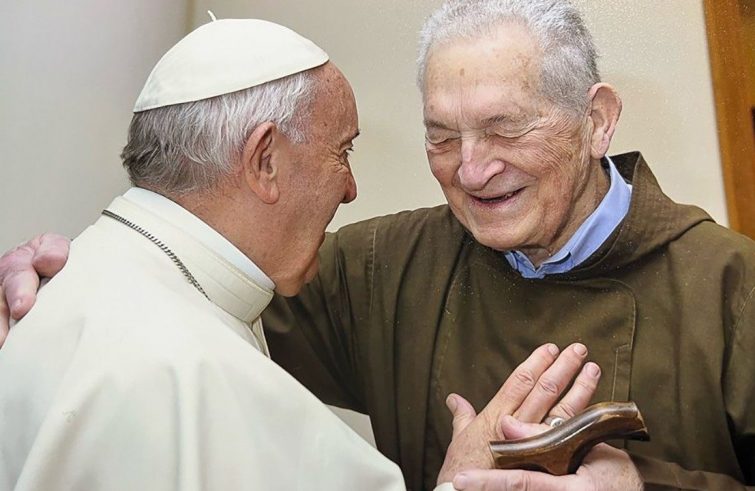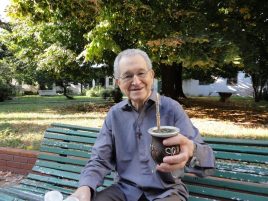
Interviewing him almost makes you feel “guilty.” In fact, talking to him means distracting him, even if for a few minutes, from his main activity, the one for which he is known throughout Buenos Aires and now the world: hearing the confessions of the faithful who flock every day to the Nueva Pompeya Shrine, in the southern district of the Argentine capital, run by the Capuchin Franciscans. Father Luis Pascual Dri, 96, has not changed his habits since Pope Francis added his name to the list of cardinals last July 9. In fact, the Holy Father chose him precisely for his tireless work as a confessor, for his ability to make visible the welcoming and merciful face of God. Archbishop Jorge Mario Bergoglio had come to appreciate these qualities during his ministry in Buenos Aires.
The Pope has described him as an “icon of the confessor”,
and it is for this reason that he will be made a Cardinal on Saturday September 30, even though he is not a Bishop. In fact, Father Dri’s curriculum is rich and varied, but it is accurate to say that over the years this has become his “field of expertise.”
He was born on April 17, 1927, in Federación, Entre Rios Province, Argentina, in a family where all but one of the children consecrated themselves to God in religious life. In January 1938, at the age of 11, he entered the Capuchin Seminary, where he completed his primary and secondary studies. He entered the novitiate in the district of Montevideo, Nuevo Paris, Uruguay. He received the Capuchin habit on February 21st 1945. In 1949 he made the profession of perpetual vows. On March 29, 1952, he was ordained a priest in the Cathedral of Montevideo. Since then, he has held many positions, as director of seminaries, master of novices, formator, in many different parts of Argentina, with a short period in Europe, in 1961, to specialise as a formator of novices. He served as parish priest on many occasions and at the beginning of the year 2000 he was transferred to the Shrine of Our Lady of Pompeya in Buenos Aires, where he remained for three years before being transferred to Mar del Plata. In 2007 he made his definitive return to the Buenos Aires Shrine.
Today, at the age of 96, he continues to serve the Lord from the confessional, where he spends many hours each day administering the Sacrament of Reconciliation.
“No, I will not be in Rome, although I would have liked to embrace Pope Francis,” Father Dri told SIR. “My health will not allow it. I will receive the insignia here in Buenos Aires, the Archbishop has called me and there will be a celebration.” The Capuchin priest uses a wheelchair to move around, but his voice is crystal clear, his reasoning sharp, combined with a considerable amount of irony, mixed with empathy and lively cordiality.

Let’s go back to July 9, two and a half months ago. How did you feel when you received the news?
I was taken completely by surprise. When they first told me this, I thought it was a joke. But when I realised it was true, I started crying a lot, I didn’t know what to say and what to do! Now I am calmer, I realise that the Lord had mercy on me with this recognition.
What is your “secret” as a confessor?
Indeed, I consider myself a tireless confessor. There is a great need for this today. There are so many difficult situations in the world that are spreading and affecting people.
People say of you that you are ‘too good’, that you forgive everyone….
I don’t deny it, but I always say to Jesus: “You are the one who forgave too much, who forgave everybody!”
I try to do what he did. Jesus never denied forgiveness to anyone.
I used to know Archbishop Bergoglio very well, and he has also, so to speak, “forgiven” me for this.
Is hearing confession part of your daily life?
It can be described as my job, from the early hours of the morning. I do my best to be welcoming and to be a listening ear for the faithful. These are years of great uncertainty, marked by a widespread lack of peace and tranquility. It is important to share the love of Jesus. He is at the centre of everything! I learned this as a child, from my mother, who taught me to be a believer. My father died when I was four.
What words do you use to communicate this priority?
I try to teach serenity and inner peace. It is important not to hate, not to hold grudges.
Forgiveness breeds forgiveness and that is the only remedy, even in a situation where the air is polluted with hatred,
as is the case in our Argentina. There are many divisions in society, but also in the Church, and we need to change. Conversion has only one name: the person of Jesus. The relationship with Jesus is what is fundamental, more than ‘religion’, more than the content of catechesis. Everything begins from here, from being one with him. In him we must put our trust, he is peace, he is our life.
Is it true that you admire other famous Capuchin saints, great confessors, such as Leopold Mandic and Pius of Pietrelcina?
I certainly do! I have visited the places of St Leopold in Padua. He died during the war, but he was a great man of peace and communion. He dedicated himself to confession, he humbly promoted reconciliation. I met Saint Padre Pio personally in San Giovanni Rotondo. I made my confession to him in 1961, I spoke to him, and then again in 1968. Both of them are a great inspiration for me in the hearing of confessions.
What did the Pope say to you?
When I told him that I could not come to Rome, he said not to worry! After all, I had the opportunity to be with him for a few days in Santa Marta in 2018. On that occasion, too, I saw him as a father who embraces and blesses, but above all as a brother.
Do you have a final message for us?
Through us, the world must know that God is good, that he always forgives, that we must not be afraid.
(*) journalist at “La vita del popolo”











